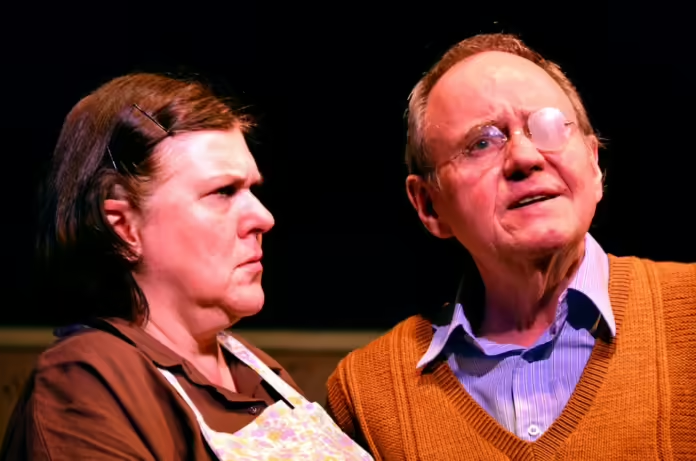Harry Dewar’s direction of Peter Kenna’s play “A Hard God” for the St Jude’s Players is unadorned, honest and immensely satisfying. Don Oakley’s design of the all purpose, well used Cassidy living room evokes the era of post WW2, the Cassidy family working class status, and, most importantly, exudes the warm affection of inhabitants Dan and Aggie. Unusually for a Catholic dwelling of the time the room displays no visual items of religion. The room and its generous space comfortably carries the narration and location of (both) story sets. Lighting design by Ian Thompson is key to this. The use of blue filters to cut to and carry the scenes with Joe and Jack is a simple and effective tool. The tiny detail of Martin Cassidy flicking the living room light switch off at curtain call’s end was an apt finale touch.
Dewar’s communion with his evenly talented cast was clear to see. Each of the ensemble was true to their character and nothing grated nor felt out of place. A minor quibble for me was that pace was a little uneven. Pauses seemed a little protracted or cues not picked up quickly enough, but it was first night and these issues will no doubt disappear. The three brothers Cassidy along with Dan’s wife Aggie and their son Joe formed a most believable extended family unit.
Dan, played with astute skill by Lindsay Dunn is the terra firma for his two brothers. Even his “bad” eye and an agonisingly slow diagnosis does not interfere with his genuine love and concerns for family. A natural, well controlled performance by Dunn as the pain of his eye’s condition slowly worsens and consumes him. The eldest brother, Martin, the poet, keeper of his multitudinous jottings and personal correspondence must deal with a different kind of pain. His young son’s horrific swimming pool death is his personal “albatross” and it affects him as if he were a shell-shocked war veteran. Martin’s natural brashness is tempered with bursts of reflection and sensitivity. The various complex shades of Martin are portrayed with considerable acting skill by Jamie Black. Chris Dewar’s Paddy, the youngest brother, is forever ducking and weaving his way from his aggressive out of control wife Sophie. We don’t get to meet her but she is once heard remonstrating and yelling insults outside the Cassidy dwelling. She openly and brazenly treats her husband as an inconsequential fool. Chris Dewar effectively presents Paddy as weak, desperate and cowed, thus lending credence to his wife’s opinions. However, as the play ends, we perceive he may well be finding his backbone after all. All three actors Dunn, Black and Chris Dewar provide the essential elements for a successful chemical reaction when they share the stage in part or together and all deliver smooth and skilful performances.
Dan and Aggie’s son Joe together with new friend Jack deal with the most intense personal issues in a separate but parallel playbook. They deal with these common issues in very different ways. Joe, played with great sensitive touch by Lochie Daniel, is quiet and thoughtful like his father. In facing the most private and personal of dilemmas he does his best with the teenage level of reason and experience at his disposal. He merely seeks happiness in his quest to find his true self. Daniel has us feel the agony of his confusion and we understand his last ditch attempts to keep Jack as his friend. Maybe he will find enough of the pragmatic humanity his parents have in order to find a successful pathway?
Jack, Archie Rowe, the initiator of their closeness, is played with a devil may care touch. At least at first! A little brazen, a touch adventurous and a little too revealing about himself. For a young actor Rowe navigates all of the above with admirable success. It is he, not Joe, who seeks the sanctity, the safety and the forgiveness of the confessional. He is guided by what he defines as his faith, his fears, his guilt and mounting misgivings for his soul. Joe remains crystal clear in his motives and sums that up by declaring “I was happy and that’s not a sin”! Both actors, to their credit, wove a believable path around and through a complexity of emotions that are perennial issues of delicate sensitivity.
Rebecca Gardner’s Monica is spot on with her proclamations and action borne of of religious zeal. In her brief but telling stage appearance she looks and sounds exactly as we expected. Gardner’s voicing off stage contribution as Paddy’s shrewish wife Sophie is equally telling.
If Dan and Aggie Cassidy are the ones to keep their family glued together, it is Aggie who is the practical brown wrapping paper who successfully completes the parcel. April Stuart delivers a quiet and wonderfully understated performance as Dan’s well loved wife and the family fixer. She not only loves her husband, she believes in him, which is stated with sincere clarity to Dan’s question, “What do you really think about God, Aggie”? A fine, well judged and subtly modulated performance.
Peter Kenna’s play remains to this day surprisingly thought provoking. It was for me a springboard for both nostalgia and discussion, particularly if you are a child of the 1950’s and lived in any suburban Adelaide street. I really appreciated the return journey.
Photo credit: Les Zetlein



